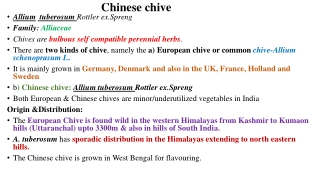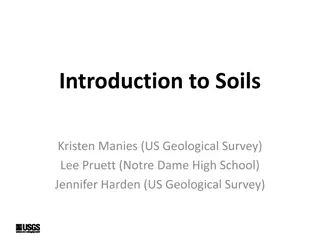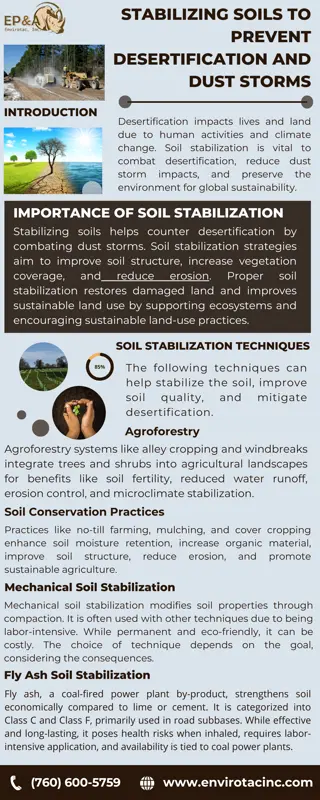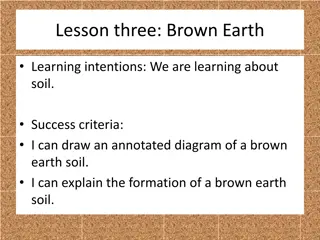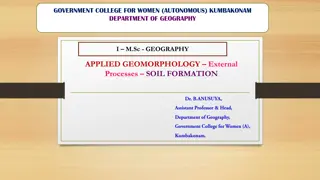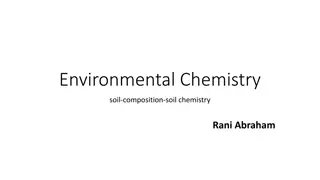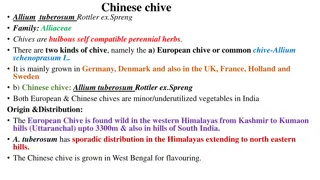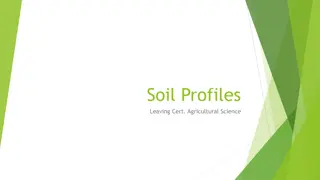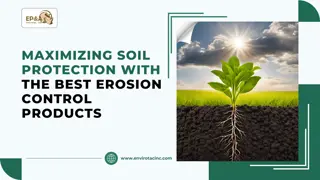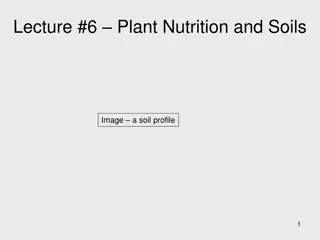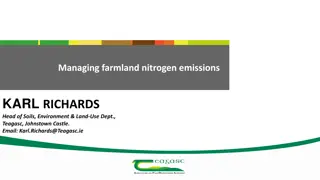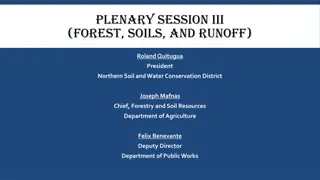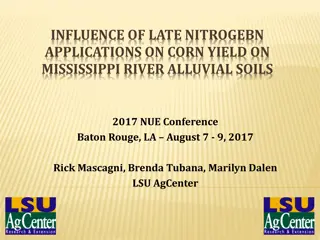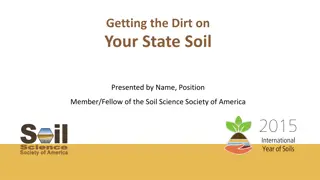Chinese chive
Chinese chives, scientifically known as Allium tuberosum, are bulbous perennial herbs that are underutilized in India. They are cold-hardy plants that prefer temperatures between 17°C and 25°C and well-drained soils with a pH range of 6-7. Chinese chives have multiple culinary uses due to their mi
0 views • 7 slides
Understanding Radon Exposure Risks and Prevention Measures
Radon is a colorless, odorless radioactive gas present in rocks and soils. It can enter buildings through cracks and pipes, posing health risks like lung cancer. Exposure to radon can lead to radiation damage to cells and increase the risk of cancer. It's essential to be aware of radon levels in ind
1 views • 14 slides
Exploring the Health Benefits, Cultivation, and Varieties of Jamun Fruit
Jamun, also known as black plum, is a fruit with various health benefits such as improving haemoglobin levels, aiding in digestion, and managing diabetes. It thrives in tropical climates and a variety of soils. The fruit comes in different varieties like Ram Jamun and is propagated through both seed
6 views • 17 slides
Embracing Sustainability: A Comprehensive Analysis of Carbon Neutral Farming
Carbon Neutral Farming Market, also known as carbon farming or climate-smart agriculture, focuses on reducing greenhouse gas emissions and sequestering carbon in soils and vegetation.
3 views • 2 slides
Are There Any Food or Dining Recommendations for a Day Trip to Barossa Valley_
The Barossa Valley, located about an hour's drive northeast of Adelaide, is one of\nAustralia's most renowned wine regions. But the fertile soils, Mediterranean climate,\nand generations of culinary tradition have also made it a paradise for food lovers. A\nBarossa Valley day trip from Adelaide allo
3 views • 5 slides
Understanding the Dynamics of Soil: Formation, Properties, and Influences
Soil, the foundation of life on Earth, is a complex system influenced by various factors such as utilitarian, ecological, and pedologic processes. This introduction covers the definition of soil, its importance in agriculture and ecosystems, the formation processes, services provided by soils, threa
1 views • 24 slides
Stabilizing soils to prevent desertification and dust storms
Desertification impacts lives and land due to human activities and climate change. Soil stabilization is vital to combat desertification, reduce dust storm impacts, and preserve the environment for global sustainability.\n
2 views • 11 slides
Stabilizing soils to prevent desertification and dust storms
Desertification impacts lives and land due to human activities and climate change. Soil stabilization is vital to combat desertification, reduce dust storm impacts, and preserve the environment for global sustainability.\n
1 views • 1 slides
Understanding Soil and Foundation Engineering Fundamentals
Soil plays a crucial role in engineering, with unique properties that influence its mechanical behavior. This article covers the formation of soil, types including residual and transported soils, and the phases of soil in nature. Explore phase diagrams, relationships between volume, void ratio, and
0 views • 20 slides
Overview of Soil Groups in Agricultural Science
The Leaving Certificate Agricultural Science delves into various soil groups in Ireland, including Podzols, Brown Earths, and more. The classification of soils helps determine their best use in different areas, showcasing their characteristics and potential productivity. The study highlights the imp
0 views • 18 slides
Tea Cultivation in India: A Comprehensive Overview
Tea cultivation in India has a rich history dating back to 1823 when British settlers discovered wild tea plants in Assam. Today, India is the second-largest tea producer globally. Major tea-producing regions include Assam, West Bengal, Tamil Nadu, and Kerala. The ideal conditions for tea growth inc
0 views • 11 slides
Understanding Brown Earth Soil Formation in Temperate Broadleaved Forests
Brown Earth soils are characteristic of temperate broadleaved deciduous forests in regions like Western Europe, Russia, and North America. Deciduous trees contribute to the formation of these soils by providing a rich leaf litter that breaks down rapidly due to the mild climate. Soil organisms play
1 views • 17 slides
Understanding Cohesive Devices in Writing
Cohesive devices such as adverbials, determiners, and pronouns play a crucial role in creating a flow in writing. By organizing adverbials into groups based on where, when, how, and how often they describe actions, writers can enhance the clarity and coherence of their texts. Additionally, recognizi
1 views • 11 slides
Exploring the Importance of Soil in Education
Gratitude to educators for their interest in the "Soils: Fundamental to Life" webinar presentation. The presentation emphasizes the significance of soil in ecosystems, featuring renowned speakers and informative content. Sponsored by NESTA, the session aims to enhance Earth and Space Science educati
1 views • 52 slides
Understanding Soil Formation: Factors and Processes Explained
Soil formation is a complex process influenced by factors like parent material, topography, climate, organisms, and time. This article delves into the fundamentals of soil evolution, discussing how soils are formed from weathered rock materials and the role of pedogenesis. Factors affecting soil for
1 views • 28 slides
Understanding Polycyclic Aromatic Hydrocarbons (PAHs) and Their Impact
Polycyclic Aromatic Hydrocarbons (PAHs) are ubiquitous environmental pollutants found in nature and from human activities like combustion. They affect public water construction permitting processes by influencing material standards. PAHs can be harmful concerning health when soils are disturbed duri
0 views • 6 slides
Understanding Geography: Earth's Description and Study
Geography, coined by Greek scholar Eratosthenes, encompasses the description and explanation of Earth's surface differentiation. It involves physical and human aspects, with branches like geomorphology, climatology, and economic geography. Physical geography studies the lithosphere, atmosphere, hydr
0 views • 6 slides
Construction Project Brief: Apartment Building in Gisenyi, Rwanda
This project brief outlines the construction of an apartment building owned by Mr. TUYISHIMIRE Eric in Gisenyi, Rwanda. The project includes details such as project location, neighborhood context, project analysis, site analysis including hydrology and soils, and access to infrastructures such as wa
1 views • 6 slides
The Fascinating Venus Fly Trap - A Carnivorous Plant
The Venus Fly Trap, scientifically known as Dionaea muscipula, is a unique carnivorous plant found in the southern swamps of the US. It is a eukaryotic, multicellular autotroph that thrives in poor, nutrient-deficient soils by capturing insects for essential nutrients like nitrogen. Its trapping mec
0 views • 12 slides
Understanding Soil Chemistry and Redox Reactions in Environmental Chemistry
Soil chemistry plays a crucial role in sustaining healthy soils by influencing nutrient availability through oxidation and reduction processes. Redox reactions in soil are impacted by factors like oxygen content and water presence, affecting nutrient supplies. The redox status of soil reflects its n
1 views • 92 slides
Comprehensive Overview of Mustard Plant Cultivation
Mustard, scientifically known as Brassica indica, is a cool-season crop with origins in Europe. India leads in mustard production, with over 150 species primarily found in temperate regions. This versatile plant thrives in different soils and climatic conditions, offering a wide range of cultivation
0 views • 16 slides
Comprehensive Guide to Chinese Chive (Allium Tuberosum): Botany, Cultivation, and Uses
Chinese chive, a bulbous perennial herb, comes in two varieties - European and Chinese. Originating from the Himalayas and being grown in various regions, it is a minor vegetable in India. Known for its mild garlic-like flavor, chive leaves are rich in nutrients and used in cooking, salad, and tradi
0 views • 7 slides
Understanding Soil Profiles in Agricultural Science
Soil profiles are essential for classifying soils, with main profiles being Brown Earth, Podzol, and Gley. It's crucial to draw these profiles accurately for exams, considering horizons like O Horizon, A Horizon, B Horizon, and Bedrock. Brown Earth has a thick O horizon with uniform brown color, Pod
1 views • 8 slides
Explore the Hidden World Beneath Your Garden: Soils and Rocks
Discover the fascinating underground world of soils and rocks in your garden. From minibeasts to plant roots, water filtration to bedrock layers, this article uncovers the secrets beneath your feet.
0 views • 19 slides
Who Wants To Be A Millionaire: Rocks and Soils
A themed quiz featuring questions about rocks and soils, with images for each question. Test your knowledge on geology and have fun learning about different types of rocks and their uses in various applications.
0 views • 61 slides
Maximizing Soil Protection with the Best Erosion Control Products
\"Proper erosion control methods and the right products are crucial for protecting soils, maintaining land productivity, and ensuring long-term environmental sustainability.\
0 views • 11 slides
Maximizing Soil Protection with the Best Erosion Control Products (1)
\"Proper erosion control methods and the right products are crucial for protecting soils, maintaining land productivity, and ensuring long-term environmental sustainability.\"\n
0 views • 1 slides
Advances in Soils: Enhancing Human Sustainability Through Knowledge and Technology
Delve into the world of soil science through the lens of Jim Akin, with a focus on environmental soil science and the goal of sustainable agriculture. Explore the challenges posed by population growth and the historical advances that have shaped modern soil science practices. Discover the traditiona
0 views • 29 slides
Bayesian Methodology for Soil Parameters Retrieval from SAR Images
Surface soil moisture retrieval is crucial for various applications such as climatic modeling, hydrological studies, and agronomy. This work focuses on developing a soil moisture retrieval algorithm using the SAOCOM L-Band polarimetric SAR system in Argentina. Limiting factors include spatial variab
1 views • 16 slides
Plant Nutrition and Soils: Essential Elements and Resource Requirements
Explore the essential elements required for plant growth, how plants acquire resources, the role of soils in providing nutrients, and the composition of plant tissues. Key concepts include resource acquisition methods, soil factors, and the importance of water in plant tissue. Critical thinking ques
0 views • 140 slides
Understanding the Importance of Soil Systems
Soils play a vital role in the Earth's ecosystems by forming at the interface of various elements like the atmosphere, lithosphere, biosphere, and hydrosphere. They consist of weathered bedrock, organic matter, air, and water, making them essential for sustaining life. Soil interactions with differe
0 views • 36 slides
Understanding Nitrogen Deficiency in Waterlogged Soils
Explore the impact of waterlogged soils on nitrogen deficiency in plants and discover the role of active transport, soil oxygen displacement, and chlorophyll production. Engage students in solving the issue through an interactive activity that integrates their knowledge of plant biology concepts.
0 views • 12 slides
Building Cohesion in Writing: Cohesive Devices and Techniques
Understand the importance of cohesion in writing and how to achieve it using cohesive devices such as conjunctions, transitional phrases, synonyms, and pronouns. Learn how to organize your ideas coherently, use signposts effectively, and structure your writing for better readability. Enhance your wr
0 views • 18 slides
Managing Farmland Nitrogen Emissions: Strategies and Research Updates
Soils play a crucial role in greenhouse gas emissions and carbon sequestration. Karl Richards, Head of Soils, Environment & Land-Use Department at Teagasc, discusses the importance of managing farmland nitrogen emissions through various practices. Research focuses on reducing emissions and enhancing
0 views • 8 slides
Plenary Session III on Forest, Soils, and Runoff Featuring Key Speakers
The Plenary Session III on Forest, Soils, and Runoff showcased insights from prominent figures such as Roland Quitugua, President of the Northern Soil and Water Conservation District, Joseph Mafnas, Chief of Forestry and Soil Resources at the Department of Agriculture, and Felix Benevante, Deputy Di
0 views • 4 slides
Influence of Late Nitrogen Applications on Corn Yield on Mississippi River Alluvial Soils - 2017 NUE Conference
Excessive rainfall in the lower Mississippi Delta can lead to late-season nitrogen deficiency in corn crops. Research conducted at the LSU AgCenter focused on evaluating the efficacy of supplemental nitrogen at late growth stages on Mississippi River alluvial soils. Field experiments from 2006 to 20
0 views • 19 slides
Field Compaction Equipment and Methods in Highway Engineering
Compaction of soil in highway engineering is crucial for ensuring the stability and durability of road structures. Different types of compaction equipment, such as rollers and rammers, are used based on soil characteristics. Cohesive soils like clay require high impact force for compaction, while gr
0 views • 11 slides
Exploring State Soils: Unveiling the Secrets Beneath Our Feet
Delve into the fascinating world of state soils with detailed information on soil series, drainage, climate, parent materials, and more. Learn how to uncover the characteristics of specific soil series and understand their taxonomy, typical profiles, and allowable differences within the series. Disc
0 views • 17 slides
Insights on the Parable of the Four Soils: Matthew 13:3-11 & 18-23
Explore the profound teachings of the Parable of the Four Soils from Matthew 13:3-11 & 18-23. Delve into the significance of the seeds, the different types of soil representing hearts, and the consequences of a hardened heart in receiving the message of the Kingdom. Reflect on historical and biblica
0 views • 7 slides
Efficient Bitruss Decomposition for Large-scale Bipartite Graphs
Bitruss decomposition is a powerful concept in graph theory to identify cohesive subgraphs in bipartite graphs. This paper by Kai Wang, Xuemin Lin, Lu Qin, Wenjie Zhang, and Ying Zhang presents an efficient approach for computing bitruss numbers of edges in large-scale bipartite graphs. The study ex
0 views • 25 slides
